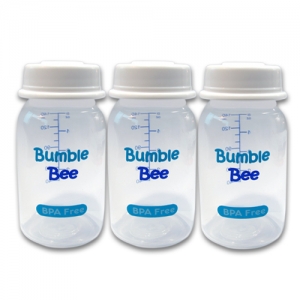Plastic baby bottles have received extra attention recently as research came to light showing many popular models leach Bisphenol-A (BPA), a suspected endocrine disruptor. While there’s little scientific data on the effects of BPA on humans, studies on animals suggest that it may not be safe, and have linked BPA to a range of cancers, early on-set puberty, obesity, and type-II diabetes.
Problems arise when the chemical leaches out of the bottle or container into the liquid or food that’s in contact with the plastic. If your baby drinks from one of these bottles — or consumes formula packaged in one of these cans — it’s possible that he’s also getting a dose of BPA. The amount of the chemical that leaches depends on the type of cans, the temperature used to sterilize the formula after the can is sealed, and the food itself.
Many parents hence believe that they should consider steps to reduce infants’ exposure to BPA when possible. When it comes to infants and small children, yes, it is always “better to be safe than sorry”.
Why using a PP Breastmilk Bottle?

The plastic of concern, polycarbonate (plastic #7), is used by several manufacturers for the baby bottles, but there are safer alternatives. While we recommend using glass bottles when possible, we realize that plastic is the most convenient option for many moms. All existing research maintains that polypropylene (PP or plastic #5) is safe and still the best and economical option for storing the mothers’ precious breastmilk. The PP plastic bottles are BPA-, phthalate-, and PVC-free.
While all of us and our children are regularly exposed to low levels of a myriad of chemicals, including BPA, there are some measures we can take to avoid at least some of these exposures. A good general principle is to avoid unnecessary exposures to chemicals in your food and water and to choose options that convey lower exposure whenever possible.
Tips and Guidelines
If you’re concerned about your baby’s exposure to BPA, his baby bottle or formula container is an important source to address. Here are some concrete things you can do that shouldn’t hurt and might help:
- Breastfeed your baby. This one step will avoid BPAs in both bottles and formula can liners.
- If you bottle-feed your baby, use glass baby bottles or those made from BPA-free plastic instead of polycarbonate bottles. If you’re using plastic, look for bottles labeled “BPA free” or buy bottles made of polypropylene, which are usually opaque or colored rather than clear. Polyethersulfone or PES, a high resilient thermoplastic polymer with low protein retention, is also increasingly available. It’s safe and meets all the stringent requirements of US FDA standard for baby feeding bottle application.
- Get rid of polycarbonate baby bottles and sippy cups that turn cloudy or are scratched or cracked. Worn bottles may leach BPA more easily.
- Don’t put polycarbonate bottles or sippy cups in the microwave. Some studies show that high heat can cause more leaching of the chemical. When necessary, warm the bottle or cup by placing it in a pan of hot water.
- Whichever type of bottle you use, be sure to carefully follow the manufacturer’s instructions for preparing and heating the formula. Formula needs to be gently warmed, not boiled. (In addition to causing more leaching, hot formula can burn your baby’s mouth and cause nutrients in the formula to break down.)
- Use powdered rather than liquid formula. While both liquid and powdered formula cans contain BPA, powdered is a safer choice. The Environmental Working Group has calculated that babies fed reconstituted powdered formula probably receive eight to 20 times less BPA than those fed liquid formula from a metal can.
- When buying plastic bottles, look at the bottom of the containers. Avoid those labeled 7, as they may contain BPA. (Those labeled 3 may contain phthalates and those labeled 6 may contain styrene, so you’ll want to avoid those numbers, too.) Use only containers coded 1, 2, 4, or 5.
- Don’t put plastic dishware or containers in the microwave or dishwasher, and don’t wash them with harsh detergents. High heat and abrasive cleansers can damage the plastic, which will make it leach more.
The above information is researched and extracted from BabyCenter and Environmental Working Group websites.
